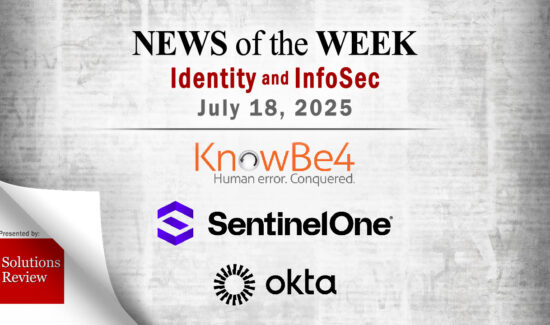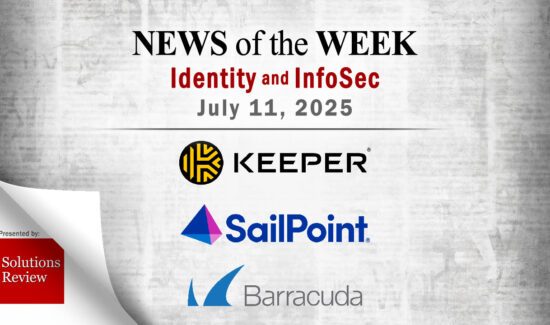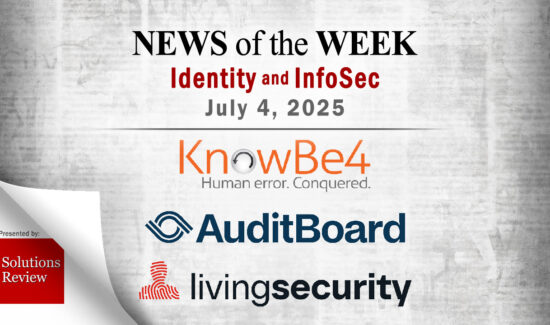Identity Management and Information Security News for the Week of December 1; Veeam, Optiv, BTQ, and More


The editors at Solutions Review have curated this list of the most noteworthy identity management and information security news for the week of December 1. This curated list features identity management and information security vendors such as Veeam, Optiv, BTQ, and more.
Keeping tabs on all the most relevant identity management and information security news can be a time-consuming task. As a result, our editorial team aims to provide a summary of the top headlines from the last month, in this space. Solutions Review editors will curate vendor product news, mergers and acquisitions, venture capital funding, talent acquisition, and other noteworthy identity management and information security news items.
Widget not in any sidebars
Identity Management and Information Security News for the Week of December 1
Veeam Introduces Zero Trust Data Resilience Model
Veeam Software, a leader in Data Protection and Ransomware Recovery, this week introduced Zero Trust Data Resilience (ZTDR), a model to help organizations reduce the risk of growing data security threats and improve their overall resilience. Developed in collaboration with Zero Trust expert Jason Garbis of Numberline Security, ZTDR applies Zero Trust principles to backup and recovery as an extension to the Cybersecurity & Infrastructure Security Agency (CISA) Zero Trust Maturity Model. Essential to ZTDR is the separation of backup management systems and their storage tiers into distinct resilience zones to reduce the attack surface and limit the potential blast radius from breaches; and immutable backup storage, to ensure that data cannot be modified even in the event of a ransomware attack.
Okta Admits Hackers Accessed Data on All Customers During Recent Breach
U.S. access and identity management giant Okta says hackers stole data about all of its customers during a recent breach of its support systems, despite previously stating that only a fraction of customers were affected. Okta confirmed in October that a hacker used a stolen credential to access its support case management system and steal customer-uploaded session tokens that could be used to break into the networks of Okta customers. Okta told TechCrunch at the time that around 1 percent of customers, or 134 organizations, were affected by the breach. In a blog post published on Wednesday, Okta chief security officer David Bradbury said the company has since determined that all of its customers are affected by the breach. Okta spokesperson Cat Schermann would not provide an exact figure when asked by TechCrunch, but Okta has around 18,000 customers, according to the company’s website, including 1Password, Cloudflare, OpenAI and T-Mobile.
KyberSwap Hacker Demands Full Control Over Kyber in Bizarre On-Chain Message
The hacker responsible for draining $47 million from decentralized exchange protocol KyberSwap last week outlined their demands in a bizarre on-chain message. The attacker’s demands include complete control over the company behind Kyber, “temporary” complete control over the project’s governance mechanism (KyberDAO) to enact “legislative changes,” and “all documents and information related to company/protocol formation, structure, operation, revenues, profits, expenses, assets, liabilities, investors, salaries, etc.” They also demanded the surrender of all company on-chain and off-chain assets, including shares, equity, KNC and other held tokens, websites, servers, passwords, code, social channels and all intellectual property. If the demands are met, the hacker said they will buy out company executives at a fair valuation, saying: “You haven’t done anything wrong. A small error was made, rounding in the wrong direction, it could have been made by anyone. Simply bad luck.” The attacker said remaining employees would have their salaries doubled, and those not wanting to stay would receive a 12-month severance package.
Optiv + ClearShark Appoints Daniel Wilbricht as President
Optiv + ClearShark, a cybersecurity and IT solutions provider focused exclusively on serving the U.S. federal government, has named Daniel Wilbricht as the company’s new president. Wilbricht will also serve as a member of Optiv’s executive leadership team, where he’ll focus on growing the cyber advisory and solution leader’s presence in the U.S. public sector. Optiv acquired Maryland-based ClearShark in March 2023. The acquisition more than doubled Optiv’s federal presence, while significantly deepening its bench of government expertise and expanding the breadth of its federal capabilities. Over the past two years, Optiv + ClearShark’s previous president — Brian Strosser — architected and executed a growth strategy that was mission-focused and results-driven. Wilbricht will continue building on Strosser’s strong foundation by leveraging his 25 years of public sector experience to drive the next phase of the company’s growth.
BTQ Enters Research and Collaboration Agreement with Hon Hai Research Institute
BTQ Technologies Corp., a quantum technology and PQC solutions provider, is pleased to announce that it has entered into a Research and Collaboration Agreement (the “Agreement” or “Research Program”) with Hon Hai Research Institute, a key think tank for Hon Hai Technology Group (Foxconn), the world’s largest electronics manufacturer and a leading technological solution provider. The goal of the collaboration is to promote the standardization of post-quantum cryptography.
The Cybersecurity Insight Jam Returns for Fifth Year on December 5th
Insight Jam LIVE, the annual element of Solutions Review’s Insight Jam, an always-on community for enterprise technology end-users, experts, and solution providers, kicks off its fifth year; starting with the Cybersecurity Insight Jam on December 5th. Expect roundtable discussions to take place throughout the day, featuring thought leaders from GitGuardian, Lenovo, Aware, LoginRadius, and more!
Expert Insights Section
 Watch this space each week as our editors will share upcoming events, new thought leadership, and the best resources from Insight Jam, Solutions Review’s enterprise tech community for business software pros. The goal? To help you gain a forward-thinking analysis and remain on-trend through expert advice, best practices, trends and predictions, and vendor-neutral software evaluation tools.
Watch this space each week as our editors will share upcoming events, new thought leadership, and the best resources from Insight Jam, Solutions Review’s enterprise tech community for business software pros. The goal? To help you gain a forward-thinking analysis and remain on-trend through expert advice, best practices, trends and predictions, and vendor-neutral software evaluation tools.
The Top Questions to Ask Your Government E-Signature Provider in the Digital World
Sameer Hajarnis of OneSpan asks the tough questions you need to be asking of your e-signature provider, and examines why they matter. Up until recently, the government didn’t operate the same way banks or hospitals do. In fact, they have been a little slower than commercial entities to adopt new technologies; however, budget pressure is changing that. When you think about any type of government process – storing important records, rural development, food services, public services, etc. – they all, at one point or another, used to require paper documents and some form of handwritten signatures. The adoption of digitized workflows accelerated when in-person work halted due to the COVID-19 pandemic. During this time, most traditional, paper-based signing processes were replaced with modernized e-signatures. Today, the government goes as far as turning to digital identity verification (ID) and remote online notarization (RON) to optimize higher-risk digital processes in the context of remote operations. For example, in March 2020, the Michigan Department of Technology, Management, and Budget’s (DTMB) Records Management Services deployed OneSpan Sign’s e-signature solution as an interdepartmental shared service to route documents for signature. To date, over 1,000 users have been trained to use OneSpan Sign, with roughly 90 percent of basic use cases taking less than 30 minutes of training. With this shift to digitized processes and increased use of e-signatures between agencies, security, and compliance must be top of mind. The government is set apart from other industries– their processes have a lot more oversight from numerous regulatory bodies. Government agencies also deal with the most sensitive and significant types of transactions, so it’s important that they remain secure throughout their entire lifecycle.
Overcoming the Challenges of Adding Passwordless to Legacy Apps
Steve Lay of Strata Identity bridges the gap between legacy apps and modern protocols for a true passwordless authentication experience. Passwords have been a fact of life for 60 years now, ever since MIT came up with the idea of letting multiple people share a computer by verifying a user’s identity first. But as the password nears retirement age, organizations are struggling to make passwordless authentication a reality. Eliminating passwords is being driven by the need to reduce friction, but more importantly, to implement stronger security controls such as biometrics like fingerprints, facial recognition, and passkeys that are linked to a user’s device. However, one of the challenges standing in the way of the migration away from passwords is supporting these new authentication methods on both legacy and modern platforms. In fact, almost half the IT decision-makers in a recent poll said their organizations have yet to adopt passwordless authentication because their applications are not designed to support it.
Widget not in any sidebars



















